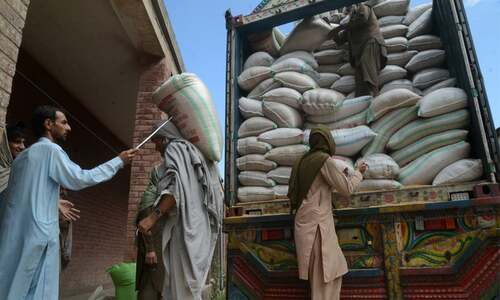AFTER last week’s jailbreak by two ‘high-profile’ sectarian terrorists from Karachi’s largest prison, suspicion immediately focused on the personnel deployed to guard the premises. Twelve of them were remanded to prison for their role in the escape of the men who between them are allegedly responsible for around 65 targeted killings. A raid on Monday by the Rangers, police, and army personnel unearthed damning evidence that there is far more than negligence on the part of the jail personnel: there is active collusion. The Central Jail operation, in which the 6,000 inmates were physically searched, resulted in the recovery of an astounding amount of contraband. This included, among other items, anti-jamming devices, 102 mobile phones, 449 televisions, 163 LCDs, 45 knives, and Rs3.5m in cash — possibly for bribing prison personnel. There were also 10 additional kitchens on the premises, aside from the official ones, catering to a ‘special class’ of prisoners from where, disturbingly enough, 150 gas cylinders were seized.
A state that cannot effectively restrain its most dangerous outlaws behind bars is a state woefully unprepared for a battle against terrorism, or to discharge its duty to protect law-abiding citizens. It has long been known that some inmates, especially those affiliated with terrorist organisations or those in the top echelons of political parties’ militant wings, continue their criminal activities from behind prison walls by giving directions to accomplices outside. Witnesses have been murdered before they could give evidence against these individuals in court and police personnel considered responsible for their incarceration targeted in reprisal killings. The bomb attack in June 2013 on the convoy of Justice Maqbool Baqar that killed nine and left the judge injured was also planned from inside Central Jail. The installation of jammers at the prison was supposed to have severed the communication links between criminals and the outside world that have had such deadly consequences. However, Monday’s raid proves that technology to properly secure lockups can easily be circumvented by that most lethal weapon of all — a corrupt prison police.
A thorough investigation into the goings-on at Central Jail is called for. No one, regardless of rank, who is guilty of pandering to inmates’ illegal demands should be spared. Particular attention should be paid to the handling of undertrials whose judicial proceedings are held in court rather than at the judicial complex inside the prison: negligent/collusive police guards make it easy for contraband such as mobiles and drugs to be slipped to them on the court premises by accomplices. Elsewhere in the country as well, provincial authorities should conduct a similar exercise at correctional facilities within their respective jurisdictions to gauge whether security measures there are up to scratch. Without condoning dishonesty among the ranks of law enforcement, it is also high time that authorities revisited the promotion and salary structure of prison police.
Published in Dawn, June 21st, 2017










































